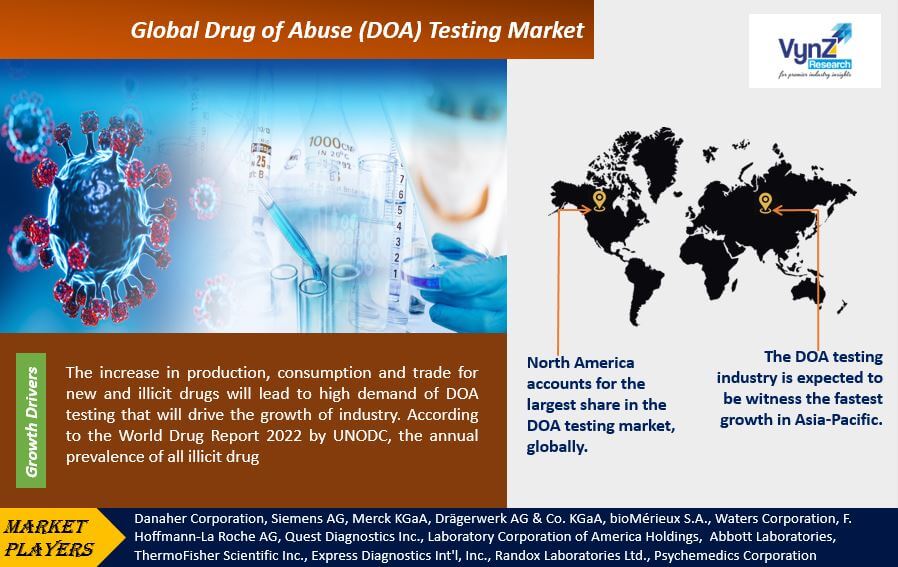Global Drug of Abuse (DOA) Testing Market – Analysis and Forecast (2026-2035)
Industry Insights by Product (Immunoassay Analyzers, Chromatography Instruments, Breath Analyzers, Rapid Test Kits, Assay Kits & Reagents), by Sample Type (Urine, Saliva, Hair, Others), by End-User (Hospitals, Diagnostic laboratories, On-the-spot Testing, Forensic Laboratories, Others), and by Geography (U.S., Canada, Germany, U.K., France, China, Japan, India, and Rest of the World)
| Status : Published | Published On : Jan, 2026 | Report Code : VRHC1026 | Industry : Healthcare | Available Format :

|
Page : 133 |
Global Drug of Abuse (DOA) Testing Market – Analysis and Forecast (2026-2035)
Industry Insights by Product (Immunoassay Analyzers, Chromatography Instruments, Breath Analyzers, Rapid Test Kits, Assay Kits & Reagents), by Sample Type (Urine, Saliva, Hair, Others), by End-User (Hospitals, Diagnostic laboratories, On-the-spot Testing, Forensic Laboratories, Others), and by Geography (U.S., Canada, Germany, U.K., France, China, Japan, India, and Rest of the World)
Drug of Abuse (DOA) Testing Market Overview
Drug of Abuse (DOA) testing is the clinical detection of one or more drugs within the human system, by sample testing. This is done to provide clinical intervention or for monitoring illegal drug intake. The Global Drug of Abuse (DOA) Testing Market was poised at USD 7.20 billion in 2025 and is estimated to reach around USD 8.1 billion in 2026. It is projected to reach around USD 18.40 billion by 2035, expanding at a CAGR of approximately 9.50% during the forecast period from 2026 to 2035. The testing for DOA requires products such as immunoassay analyzers, chromatography instruments, breath analyzers, rapid test kits, and assay kits & reagents. The rapid test kits are driving the growth of the DOA testing market and are estimated to hold the largest share in 2026.

Overall, the DOA testing market is driven by factors such as increasing drug abuse, strict regulations, and technological advancements. As the awareness of drug abuse and its consequences continues to rise, the demand for accurate and reliable drug testing methods is expected to grow in the coming years.
Drug of Abuse (DOA) Testing Market Segmentation
Insight by Product
Among the various products being used in DOA testing, the rapid test kits form the largest contributor to the industry. This category's high demand is due to the easy availability and access for on-the-spot drug testing. The rapid test kits as per its name also present output in a short time thereby having higher demand than the other product category. However, breath analyzers are estimated to grow at a fast rate with a CAGR of 9.8% during the forecast period.
Insight by Sample Type
The DOA tests make use of human samples such as urine, saliva, hair, and others. Urine is majorly used for drug of abuse testing since it contains parent drugs or metabolites in them, that is tested for the presence of major illicit drugs. The urine samples lead the global DOA testing market based on size. Some of the other sample type used includes blood, tissue, and sweat.
Insight by End User
Hospitals are the major shareholder based on the end user in the DOA testing market and is also estimated to retain the largest market size during the forecast period. The category’s large size is due to the increasing number of research and drug test being conducted. The hospitals account to hold a high number of tests due to the availability of products on a large scale as compared to other end users of DOA testing. Also, the presence of a number of clinicians in hospitals is larger, marking its large share over others. Further, diagnostic laboratories, on-the-spot testing, forensic laboratories, and others such as academic institutes.
Global Drug of Abuse (DOA) Testing Market Report Coverage
|
Report Metric |
Details |
|
Historical Period |
2020 - 2024 |
|
Base Year Considered |
2025 |
|
Forecast Period |
2026 - 2035 |
|
Market Size in 2025 |
U.S.D. 7.20 Billion |
|
Revenue Forecast in 2035 |
U.S.D. 18.40 Billion |
|
Growth Rate |
9.50% |
|
Segments Covered in the Report |
By Product, By Construction and By End User |
|
Report Scope |
Market Trends, Drivers, and Restraints; Revenue Estimation and Forecast; Segmentation Analysis; Companies’ Strategic Developments; Market Share Analysis of Key Players; Company Profiling |
|
Regions Covered in the Report |
North America, Europe, Asia-Pacific, Middle East, South America and Rest of the World |
Industry Dynamics
Trend
A growing trend witnessed by the DOA testing market is that leading players are enhancing their product portfolio through the addition of products and updating software with new substances for DOA testing, in order to maintain their competency and market share. For example, in February 2018, Shimadzu Corporation released its Smart Forensic database Ver. 2, with features for analysis of forensic toxicological substances involved in DOA in biological samples by using Gas Chromatograph-Mass Spectrometry.
In November 2017, Thermo Fisher Scientific Inc. updated its library for the Thermo Scientific TruNarc handheld narcotics analyzer. The update added 45 new substances that included 14 new forms of fentanyl to the handheld narcotics analyzer, and it can now detect Carfentanil.
Drug of Abuse (DOA) Testing Market Growth Drivers
The increase in production, consumption, and trade for new and illicit drugs will lead to high demand for DOA testing which will drive the growth of the industry. According to the World Drug Report 2017 by UNODC, the annual prevalence of all illicit drug use is 5.3% with 255 million users in 2015. This will necessitate the need for DOA testing and will thereby drive the growth of the market. The government initiatives to raise awareness against DOA and rise in organizational compliance for DOA testing will render the overall market growth. The high demand for products with increased specificity and sensitivity towards designer drugs will also add to the growth of the Drug Abuse (DOA) testing industry.
Advances in testing technologies have made drug screening more accurate, efficient, and convenient. Newer methods, such as immunoassays, chromatography, and rapid point-of-care testing, have improved the detection and analysis of drugs.
Drug of Abuse (DOA) Testing Market Industry Ecosystem
The number of suppliers in the DOA testing market is high, however, the products utilized in DOA testing need to follow stringent government regulations, and the threat of forward integration is low leading to moderate bargaining power of suppliers in the market.
Drug of Abuse (DOA) Testing Market Geographic Overview
Geographically, North America accounts for the largest share in the DOA testing market, globally. This contribution is due to the adaptation of technologically advanced products for DOA testing, increased demand for illicit drugs in the region, large-scale drug trafficking, and the increasing government initiative to spread awareness against DOA. Moreover, the DOA testing industry is expected to witness the fastest growth in Asia-Pacific.
Drug of Abuse (DOA) Testing Market Competitive Insight
Danaher Corporation is an American globally diversified conglomerate. Headquartered in Washington, D.C., the company designs, manufactures, and markets medical, industrial, and commercial products and services.
The Merck Group is a German multinational science and technology company headquartered in Darmstadt and a presence in 66 countries. The group includes around 250 companies.
The major player in the global DOA testing market includes Danaher Corporation, Siemens AG, Merck KGaA, Drägerwerk AG & Co. KGaA, bioMérieux S.A., Waters Corporation, F. Hoffmann-La Roche AG, Quest Diagnostics Inc., Laboratory Corporation of America Holdings, Abbott Laboratories, ThermoFisher Scientific Inc., Express Diagnostics Int'l, Inc., Randox Laboratories Ltd., Psychemedics Corporation, and Bio-Rad Laboratories, Inc.
The leading players through acquisitions are attaining competency and a larger market share in the global DOA testing industry.
Recent Developments by Key Players
Merck KGaA which is based in Darmstadt, Germany, has introduced the M-Trace Software & Mobile App, designed to digitise sterility testing in microbial quality control. The offering focus to enhance process safety by automatically documenting each step of the testing workflow. Sterility testing is a critical component of the pharmaceutical industry’s quality control process, ensuring that products such as vaccines and injectables are contaminant-free.
Danaher Corporation, a global science and technology innovator has collaborated with Cincinnati Children's Hospital Medical Center, with the goal of improving patient safety by addressing a leading cause of failure in clinical trials.
The DOA Testing Market report offers a comprehensive market segmentation analysis along with an estimation for the forecast period 2026–2035.
- By Product
- Immunoassay Analyzers
- Chromatography Instruments
- Breath Analyzers
- Rapid Test Kits
- Assay Kits & Reagents
- Others
- By Sample Type
- Urine
- Saliva
- Hair
- Others
- By End User
- Hospitals
- Diagnostic laboratories
- On-the-spot Testing
- Forensic Laboratories
- Others
DOA Testing Market by Region
- North America
- U.S.
- Canada
- Mexico
- Europe
- U.K.
- Germany
- France
- Italy
- Spain
- Rest of Europe
- Asia-Pacific
- Japan
- China
- India
- Rest of Asia-Pacific
- Rest of the World (RoW)
- Brazil
- Rest of RoW

Frequently Asked Questions
Purchase Options
Latest Report
Research Methodology
- Desk Research / Pilot Interviews
- Build Market Size Model
- Research and Analysis
- Final Deliverable
Connect With Our Sales Team
- Toll-Free: 1 888 253 3960
- Phone: +91 9960 288 381
- Email: enquiry@vynzresearch.com
Drug of Abuse (DOA) Testing Market
